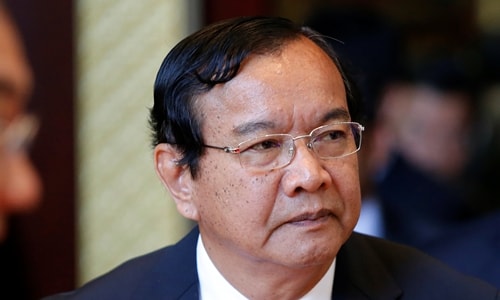Why Cambodia Prevents ASEAN from Issuing Statement on South China Sea Ruling
Cambodia said it had advised ASEAN to avoid using language that would escalate tensions between China and the Philippines in its joint statement last weekend.
 |
Cambodian Foreign Minister Prak Sokhon attended a conference in Laos on July 26. Photo: Reuters. |
At the Association of Southeast Asian Nations (ASEAN) Foreign Ministers' Meeting in Laos last weekend, ASEAN issued a joint statement but did not mention the ruling.July 12of the Arbitral Tribunal on the "cow tongue line". Cambodia, a country with very close relations with China, is said to have objected to the inclusion of this content in the communiqué, according toReuters.
Phnom Penh has advised ASEAN ministers not to use words that "escalate tensions between China and the Philippines," Cambodian Foreign Ministry spokesman Chum Sounry said yesterday.
He said the case was between the Philippines and China, not between ASEAN and China. "Therefore, ASEAN countries or Cambodia in particular should not be dragged into it," he added, describing Cambodia's stance at the meeting.
ASEAN needs to maintain its neutrality by not touching on this issue, he said.Sounry.
Responding to suggestions that China had “bought” Cambodia’s support with a $600 million soft loan a week before the summit, Mr Sounry said the allegation was “insulting”.
The Philippines said yesterday it had "pushed hard" to include the "nine-dash line" ruling in the summit's joint statement, but denied that the omission of the ruling from the final ASEAN statement was a diplomatic victory for China.
Although the ASEAN Joint Statement did not directly mention China or the “nine-dash line” ruling, it expressed concern about developments in the East Sea. The joint statement also called on parties to respect legal and diplomatic processes, in accordance with widely recognized principles of international law, including the United Nations Convention on the Law of the Sea (UNCLOS).
China has overlapping claims in the South China Sea with ASEAN countries including the Philippines, Vietnam, Malaysia and Brunei. For many years, China has maintained a stance of resolving disputes bilaterally and has firmly refused to participate in the Philippines' lawsuit.
The Permanent Court of Arbitration concluded on July 12 that China has no legal basis to claim historic rights to resources within its unilaterally drawn "nine-dash line" claim, which covers most of the East Sea.
According to VNE

